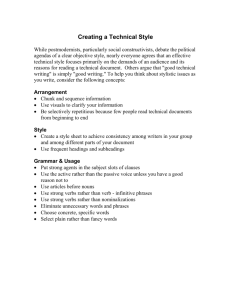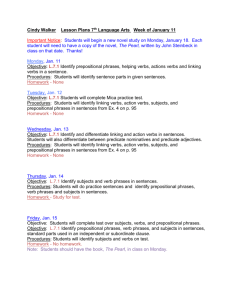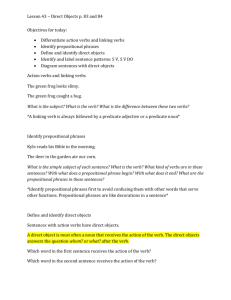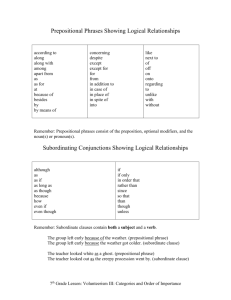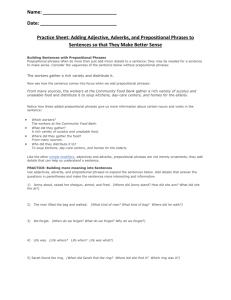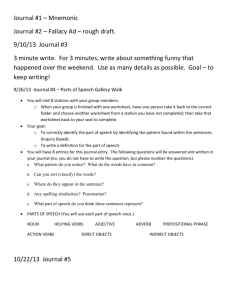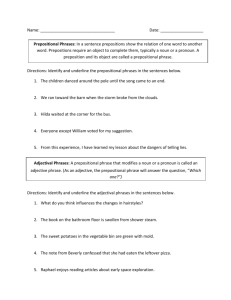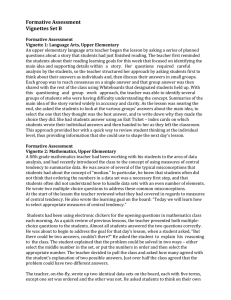Teacher`s Name: ___Julie
advertisement
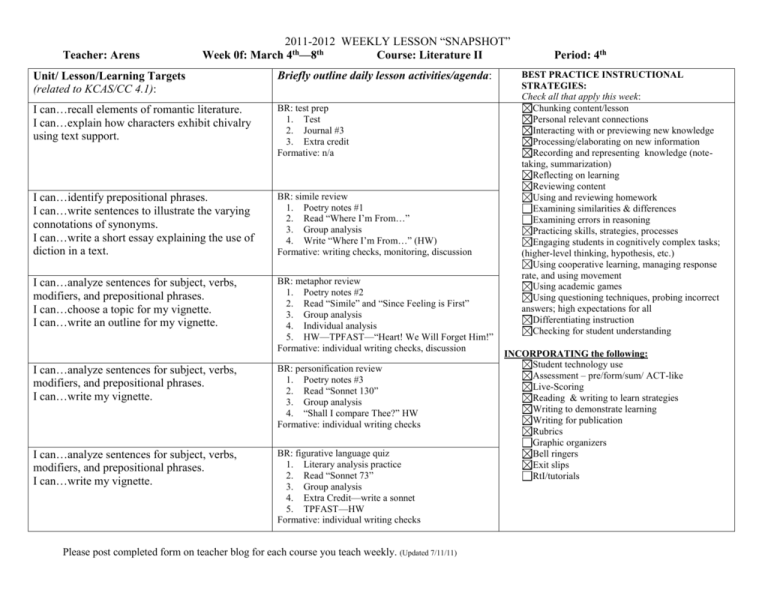
Teacher: Arens 2011-2012 WEEKLY LESSON “SNAPSHOT” Week 0f: March 4th—8th Course: Literature II Unit/ Lesson/Learning Targets (related to KCAS/CC 4.1): Briefly outline daily lesson activities/agenda: I can…recall elements of romantic literature. I can…explain how characters exhibit chivalry using text support. BR: test prep 1. Test 2. Journal #3 3. Extra credit Formative: n/a I can…identify prepositional phrases. I can…write sentences to illustrate the varying connotations of synonyms. I can…write a short essay explaining the use of diction in a text. BR: simile review 1. Poetry notes #1 2. Read “Where I’m From…” 3. Group analysis 4. Write “Where I’m From…” (HW) Formative: writing checks, monitoring, discussion I can…analyze sentences for subject, verbs, modifiers, and prepositional phrases. I can…choose a topic for my vignette. I can…write an outline for my vignette. BR: metaphor review 1. Poetry notes #2 2. Read “Simile” and “Since Feeling is First” 3. Group analysis 4. Individual analysis 5. HW—TPFAST—“Heart! We Will Forget Him!” Formative: individual writing checks, discussion I can…analyze sentences for subject, verbs, modifiers, and prepositional phrases. I can…write my vignette. BR: personification review 1. Poetry notes #3 2. Read “Sonnet 130” 3. Group analysis 4. “Shall I compare Thee?” HW Formative: individual writing checks I can…analyze sentences for subject, verbs, modifiers, and prepositional phrases. I can…write my vignette. BR: figurative language quiz 1. Literary analysis practice 2. Read “Sonnet 73” 3. Group analysis 4. Extra Credit—write a sonnet 5. TPFAST—HW Formative: individual writing checks Please post completed form on teacher blog for each course you teach weekly. (Updated 7/11/11) Period: 4th BEST PRACTICE INSTRUCTIONAL STRATEGIES: Check all that apply this week: Chunking content/lesson Personal relevant connections Interacting with or previewing new knowledge Processing/elaborating on new information Recording and representing knowledge (notetaking, summarization) Reflecting on learning Reviewing content Using and reviewing homework Examining similarities & differences Examining errors in reasoning Practicing skills, strategies, processes Engaging students in cognitively complex tasks; (higher-level thinking, hypothesis, etc.) Using cooperative learning, managing response rate, and using movement Using academic games Using questioning techniques, probing incorrect answers; high expectations for all Differentiating instruction Checking for student understanding INCORPORATING the following: Student technology use Assessment – pre/form/sum/ ACT-like Live-Scoring Reading & writing to learn strategies Writing to demonstrate learning Writing for publication Rubrics Graphic organizers Bell ringers Exit slips RtI/tutorials
